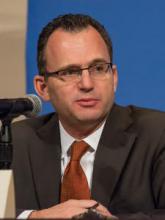MEI experts Charles Lister, Paul Salem, Randa Slim, and Gonul Tol weigh in on the intensifying battles in northern Syria, with dire predictions for the humanitarian situation as well as for the internal stability of neighbors. Lister argues the loss of the Azaz corridor would be a “catastrophic morale blow” to the Syrian opposition, while Tol believes current Turkish attacks on YPG positions is not a prelude to an invasion. Any hope for a political compromise will be lost if the regime captures Aleppo, as it would vindicate its ‘military solution’ approach to the conflict, according to Salem. The experts agree that the Russian-backed regime and YPG offensives in northern Syria will exacerbate the humanitarian crisis, with Lister predicting the refugee flow into Europe for 2016 will “significantly eclipse” that of last year. Should the armed opposition be defeated in its northern strongholds, many of the fighters may join their families living as refugees in neighboring countries. Slim highlights the threat this poses to Lebanon, where Syrian fighters may take up arms within the country against Hezbollah.
Charles Lister
Resident Fellow

Turkey doesn’t seem willing to step down from this crisis and whoever was responsible for yesterday’s bombing in Ankara, President Recep Tayyip Erdogan looks set to exploit it by undertaking further steps to support the Syrian opposition. Several thousand Free Syrian Army rebels have already been given safe passage through Turkish territory from Idlib to northern Aleppo to reinforce the defense of Azaz, and that will continue. Without serious allied reinforcement through, a ground incursion still seems a way off, for now.
More broadly, we must acknowledge that Syria is spiraling out of control, and perhaps beyond our control. Massive displacement caused by Russian bombardment will undoubtedly see 2016’s refugee flows toward Europe significantly eclipse that seen in 2015. Establishing a cease-fire in Syria seems like a pipe dream at the moment, unless we urgently de-escalate and provide assurances to the opposition that the Azaz corridor will be protected. Should the Popular Protection Units (YPG) complete its east-to-west ‘Rojava’ mission, however, Turkey will do everything it can to prevent the political process from moving forward.
Dr. Paul Salem
Vice President for Policy and Research

Developments in northern Syria represent tipping points along several axes:
- If the regime, backed by its allies, succeeds in recapturing Aleppo, it can declare a decisive political victory in reclaiming the core cities of the country, leaving the various rebel groups to fight over the more peripheral towns and regions. Any question of defeating the regime and its allies will be remote, and the regime will certainly not entertain any talk of transition.
- The Syrian regime, Russia and Iran have opted for a ‘military solution,’ and unless they suffer unforeseen major setbacks in the near future, they feel that their strategy is being vindicated. As the regime and its allies pursue the military option, the Geneva political track is dead. With a ‘political solution’ effectively off the table, the war is set to continue for many years to come—probably a decade or more.
- As the regime and allied military campaign unfolds, the stream of refugees from Syria will not only continue, but will increase steadily. The flow will burden Turkey, Jordan and Lebanon further, but millions will also stream toward Europe.
- The Kurds are benefiting from the Russian-backed regime campaign to try to unite the western and eastern parts of their Syrian enclave and secure the length of the Syrian-Turkish border under their control. This would be a historic victory for the Kurds, and for the PKK-linked Democratic Union Party (PYD), the political wing of the YPG.
- The current U.S. administration looks set to continue its disastrous policy of inaction, leaving the region and Europe to deal with the consequences. The enormous problem of Syria and ISIS will be left on the table of the next president.
Randa Slim
Director, Initiative for Track II Dialogues
-
The Saudi-Turkish Sunni alliance will feel pressured to change the dynamics of the battle, raising the costs of the military intervention for the Russians and Iranians, by supplying the rebel groups with anti-aircraft missiles. The question is whether they will do it with U.S. support or not. If done without U.S. support, the fear is that these weapons will fall into the hands of non-vetted U.S. rebel groups, including those linked to al-Qaeda.
- The whole regional tempo will move toward additional confrontation and away from conflict resolution. This means ongoing peace-making efforts in Yemen, Libya, and Iraq will be stalled. The hope for a potential resolution to the Lebanese presidential crisis will also dissipate.
- Internationally and regionally, every stakeholder in Syria is positioning in anticipation of the next U.S. president. The Russians are trying to create faits accomplis on the ground, thus constraining the range of options in Syria facing the next president. The Saudis and Turks will want to deny the Russians, Iranians and Assad a complete victory, and keep bleeding them hoping that the next U.S. president would be more amenable to confront the Russians in Syria.
- Regionally, the refugee situation will move to a different and more violent level. As more of the rebel fighters abandon the fight in Syria and start joining their families in refugee countries, they can become a source of threat to these countries' internal stability. One country of particular concern will be Lebanon. Until recently, up to 70-80 percent of the Syrian refugees have been women and children. As more of their husbands/brothers join them, we would have the making of a well-trained, ‘guns-for-hire’ constituency that will be willing to take the fight to Hezbollah inside Lebanon, especially if these families have given up the hope of returning to Syria. If there are regional sponsors that would be willing to pay them and weaponize them, Lebanon might be facing internal civil strife.
Gonul Tol
Director, Center for Turkish Studies

But it is a dangerous course since it might provoke a military confrontation with Russia, which is providing air cover to the PYD in areas that Turkey is bombing.
Tensions between the United States and Turkey peaked last week when Ankara asked Washington to pick a side between them and the PYD—the United States answered that it would continue to work with the PYD. After the Munich Security Conference, Turkey believes that the PYD will further advance in Azaz and western Aleppo with U.S. and Russian support, cutting Turkey's links to the opposition. That is why Turkey attacked the PYD and reached out to the Saudis to communicate its frustration with Washington.
The Middle East Institute (MEI) is an independent, non-partisan, non-for-profit, educational organization. It does not engage in advocacy and its scholars’ opinions are their own. MEI welcomes financial donations, but retains sole editorial control over its work and its publications reflect only the authors’ views. For a listing of MEI donors, please click here.













